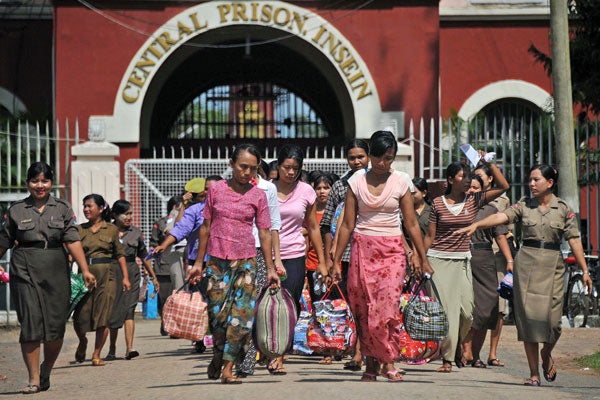According to press reports, the foreign ministers of the 10-nation Association of Southeast Asian Nations (ASEAN) bloc have approved Burma’s request for the 2014 chairmanship. The approval comes after a series of reforms from the quasi-civilian government in Naypyidaw, such as the release of Nobel Peace Prize winner Aung San Suu Kyi from house arrest, the amnesty of some political prisoners, and modest reforms to the political system.
The steps that the Burmese government has taken are certainly very welcome. It could be that these reforms are real and not just window-dressing to garner concessions from the international community—if so, we would be among the first to celebrate. Indeed, Aung San Suu Kyi, who has spent more than three-quarters of the last two decades in detention, believes that Burmese President Thein Sein is “genuine in his desire for change,” but also noted that “a lot of work needs to be done.”
However, Burma has not demonstrated that its reforms are sufficiently far-reaching, authentic, or irreversible to merit the chairmanship. The 2014 ASEAN chairmanship is a massive concession; its allure is widely assumed to be a major driver of the reform process. The following four reasons highlight why, based on current conditions on the ground, Burma does not yet deserve the chairmanship.
- More than 1,600 political prisoners remain incarcerated. According to The Assistance Association for Political Prisoners based in Thailand, 1,667 prisoners of conscience still languish in Burmese prisons. Last month, the Burmese government released around 200 political prisoners and has signaled its intention to release more soon—a signal retracted, ironically, just before ASEAN’s decision to award it the ASEAN chairmanship.
- Persecution of ethnic minorities continues unabated. The U.N. Special Rapporteur on Human Rights in Burma, Tomás Ojea Quintana, noted that human rights violations are ongoing against various ethnic groups, including “extrajudicial killings, sexual violence, arbitrary arrest and detention, internal displacement, land confiscations, the recruitment of child soldiers, [and] forced labor.” The ASEAN Inter-Parliamentary Myanmar Caucus (AIPMC), comprised of lawmakers from various member states, has urged ASEAN nations to discuss these egregious human rights abuses before any decision is made, but ASEAN has largely ignored the issue in its meetings.
- Burma continues shady dealings with North Korea, possibly involving nuclear weapons. Burma, through its military-to-military relations with North Korea, is running afoul of U.N. Security Council Resolutions 1718 and 1874. There has also been suspicion that North Korea is aiding Burma in possible nuclear developments. As Burma is a signatory to the Southeast Asian Nuclear-Weapon-Free Zone Treaty, it must be completely transparent and forthcoming regarding these dealings.
- A Burmese chairmanship could derail U.S. engagement with ASEAN. The ASEAN chair hosts every ASEAN-centered summit for an entire year, including the ministerial-level ASEAN Regional Forum (ARF) and the head-of-state level East Asia Summit (EAS). Under current conditions, it is simply inconceivable that the U.S. would continue its diplomatic engagement with ASEAN institutions under a Burmese chairmanship. ASEAN members should be aware that, in accepting Burma’s bid, they are risking cutting out U.S. participation—at least during 2014.
ASEAN has yet to officially award Burma the 2014 chairmanship, but it is planning to make the announcement during the ASEAN summit in the next few days. However, the summit is in no way an official deadline for a decision, only an arbitrary one. To that end, until Burma credibly demonstrates more transparent steps toward reform by releasing political prisoners, brokering an internationally respected cease-fire with ethnic minorities, and severing all ties with North Korea, ASEAN should withhold the chairmanship.
There is simply no reason to rush a decision on this matter. ASEAN must calmly adopt a wait-and-see approach, encouraging more reform but withholding the chairmanship until the sustainability and irreversibility of the reforms is guaranteed. This is an ASEAN decision, and its members should heed the ASEAN Inter-Parliamentary Myanmar Caucus’s recommendation that ASEAN delay its decision until Burma enacts more credible reforms.
If Burma does continue on the path of genuine reform, it may very well deserve the chairmanship in 2014. Before then, however, serious issues remain that must be addressed.
